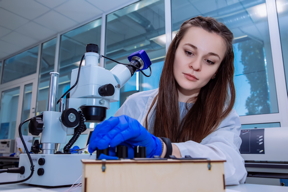Home > Press > IKBFU and University of Oviedo Physicists tested new research model on magnetic materials: Soft magnetic ferromagnetic microwires are used for magnetic field sensors, as well as for encoding and reading information
 |
| Valeria Kolesinkova |
Abstract:
Laboratory of Novice Magnet Materials working in collaboration with Spanish scientists (the University of Oviedo, Spain) tested the Preisach model using interfacing Fe-based microwires. This research was made to check whether it is applicable for FORC-analysis and how real-life conditions affect it.
IKBFU and University of Oviedo Physicists tested new research model on magnetic materials: Soft magnetic ferromagnetic microwires are used for magnetic field sensors, as well as for encoding and reading information
Kaliningrad, Russia | Posted on April 24th, 2020Soft magnetic ferromagnetic microwires are used for magnetic field sensors, as well as for encoding and reading information. Such microwires are used, for example, for the implementation of 3D geolocation in gadgets, as well as for tagging commercial fish, etc.
The sensors mainly consist of a system containing several closely spaced microwires. This research issue is relevant, and several world scientific groups from different countries (Spain, Slovakia, Brazil, Russia) are engaged in these studies.
MA Student at "Functional nanomaterials and modern applications", Valeria Kolesinkova:
"The FORC-analysis is one of the most well-known ways of magnet interaction analysis, based on the Preisach model, where the idea of a bistable microwire is introduced. To study various properties of magnetic (and not only) materials, we mainly use the well-known characterization methods, however, each method has its own applicability limits and this work shows the applicability limits of the method for analyzing magnetic interactions for ideal magnetic samples with bistable hysteresis loop. The study emphasizes the problems that can be encountered when working with this method in the framework of the Preisach model".
###
The results of the research were published in the Journal of Magnetism and Magnetic Materials (Q2). The research was funded by the 5-top-100 IKBFU project.
####
For more information, please click here
Contacts:
Denis Zhigulin
7-913-322-9355
@IKBFU
Copyright © IKBFU
If you have a comment, please Contact us.Issuers of news releases, not 7th Wave, Inc. or Nanotechnology Now, are solely responsible for the accuracy of the content.
| Related Links |
| Related News Press |
News and information
![]() Researchers develop molecular qubits that communicate at telecom frequencies October 3rd, 2025
Researchers develop molecular qubits that communicate at telecom frequencies October 3rd, 2025
![]() Next-generation quantum communication October 3rd, 2025
Next-generation quantum communication October 3rd, 2025
![]() "Nanoreactor" cage uses visible light for catalytic and ultra-selective cross-cycloadditions October 3rd, 2025
"Nanoreactor" cage uses visible light for catalytic and ultra-selective cross-cycloadditions October 3rd, 2025
![]() Researchers tackle the memory bottleneck stalling quantum computing October 3rd, 2025
Researchers tackle the memory bottleneck stalling quantum computing October 3rd, 2025
Magnetism/Magnons
![]() Researchers develop molecular qubits that communicate at telecom frequencies October 3rd, 2025
Researchers develop molecular qubits that communicate at telecom frequencies October 3rd, 2025
Possible Futures
![]() Spinel-type sulfide semiconductors to operate the next-generation LEDs and solar cells For solar-cell absorbers and green-LED source October 3rd, 2025
Spinel-type sulfide semiconductors to operate the next-generation LEDs and solar cells For solar-cell absorbers and green-LED source October 3rd, 2025
Chip Technology
![]() Lab to industry: InSe wafer-scale breakthrough for future electronics August 8th, 2025
Lab to industry: InSe wafer-scale breakthrough for future electronics August 8th, 2025
![]() A 1960s idea inspires NBI researchers to study hitherto inaccessible quantum states June 6th, 2025
A 1960s idea inspires NBI researchers to study hitherto inaccessible quantum states June 6th, 2025
![]() Programmable electron-induced color router array May 14th, 2025
Programmable electron-induced color router array May 14th, 2025
Discoveries
![]() Researchers develop molecular qubits that communicate at telecom frequencies October 3rd, 2025
Researchers develop molecular qubits that communicate at telecom frequencies October 3rd, 2025
![]() Next-generation quantum communication October 3rd, 2025
Next-generation quantum communication October 3rd, 2025
![]() "Nanoreactor" cage uses visible light for catalytic and ultra-selective cross-cycloadditions October 3rd, 2025
"Nanoreactor" cage uses visible light for catalytic and ultra-selective cross-cycloadditions October 3rd, 2025
Announcements
![]() Rice membrane extracts lithium from brines with greater speed, less waste October 3rd, 2025
Rice membrane extracts lithium from brines with greater speed, less waste October 3rd, 2025
![]() Researchers develop molecular qubits that communicate at telecom frequencies October 3rd, 2025
Researchers develop molecular qubits that communicate at telecom frequencies October 3rd, 2025
![]() Next-generation quantum communication October 3rd, 2025
Next-generation quantum communication October 3rd, 2025
![]() "Nanoreactor" cage uses visible light for catalytic and ultra-selective cross-cycloadditions October 3rd, 2025
"Nanoreactor" cage uses visible light for catalytic and ultra-selective cross-cycloadditions October 3rd, 2025
Interviews/Book Reviews/Essays/Reports/Podcasts/Journals/White papers/Posters
![]() Spinel-type sulfide semiconductors to operate the next-generation LEDs and solar cells For solar-cell absorbers and green-LED source October 3rd, 2025
Spinel-type sulfide semiconductors to operate the next-generation LEDs and solar cells For solar-cell absorbers and green-LED source October 3rd, 2025
![]() Rice membrane extracts lithium from brines with greater speed, less waste October 3rd, 2025
Rice membrane extracts lithium from brines with greater speed, less waste October 3rd, 2025
|
|
||
|
|
||
| The latest news from around the world, FREE | ||
|
|
||
|
|
||
| Premium Products | ||
|
|
||
|
Only the news you want to read!
Learn More |
||
|
|
||
|
Full-service, expert consulting
Learn More |
||
|
|
||








